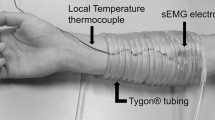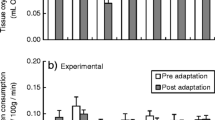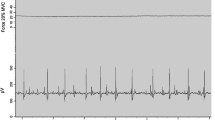Abstract.
The purpose of the present study was to investigate the effect of muscle temperature on the force/velocity relationship of electrically activated human adductor pollicis muscle. Following immersion of the lower arm for 20 min in water baths of four different temperatures, the calculated muscle temperatures were 37.1, 31.4, 25.6 and 22.2°C. At 22.2°C maximal isometric force was reduced to 79.3±2.9% of the force obtained at 37.1°C. Q 10 values for the maximal rates of force development and relaxation, and relaxation times, were about 2.0 between 37.1 and 25.6°C and increased to about 3.5 below 25.6°C. The Q 10 values of the maximal shortening velocity and the velocity for maximal power production were similar to those of the isometric speed parameters. The Q 10 for maximal power production increased from 2.0 above 31.4°C to 6.9 between 25.6 and 22.2°C. Following repetitive isometric contractions maximal power production was reduced to 60.0±1.7 and 90.5±1.0% at 37.1 and 22.2°C respectively. Fatigue decreased with cooling of the muscle over the entire (37.1–22.2°C) temperature range.
Similar content being viewed by others
Author information
Authors and Affiliations
Additional information
Electronic Publication
Rights and permissions
About this article
Cite this article
De Ruiter, C., De Haan, A. Temperature effect on the force/velocity relationship of the fresh and fatigued human adductor pollicis muscle. Eur J Physiol 440, 163–170 (2000). https://doi.org/10.1007/s004240000284
Received:
Accepted:
Issue Date:
DOI: https://doi.org/10.1007/s004240000284




